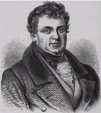Identity Statement for Daniel O’Connell
- Reference code: IE UCDA P12
- Title: Papers of Daniel O’Connell (1775–1847)
- Dates: 1750–1895
- Level of description: Fonds
- Extent: 10 boxes
 Born near Cahirciveen, County Kerry and adopted at an early age by his uncle Maurice ‘Hunting Cap’ O’Connell. His family had strong trading links with the Continent and he was educated at Saint-Omer and Douai; entered Lincoln’s Inns in 1794 and was called to the Bar in Dublin in 1798. A co-founder of the Catholic Association in 1823, he realised the movement’s enormous potential with the creation of the Catholic rent, enabling ordinary Catholics to become members for one penny a month and creating a substantial reserve of funds for a political campaign. A series of election victories culminated with O’Connell being returned as MP for Clare in 1828 and the Government introducing Catholic emancipation the following year. At the same time, however, they disenfranchised the forty-shilling freeholders who had been the bedrock of the Association’s success.
Born near Cahirciveen, County Kerry and adopted at an early age by his uncle Maurice ‘Hunting Cap’ O’Connell. His family had strong trading links with the Continent and he was educated at Saint-Omer and Douai; entered Lincoln’s Inns in 1794 and was called to the Bar in Dublin in 1798. A co-founder of the Catholic Association in 1823, he realised the movement’s enormous potential with the creation of the Catholic rent, enabling ordinary Catholics to become members for one penny a month and creating a substantial reserve of funds for a political campaign. A series of election victories culminated with O’Connell being returned as MP for Clare in 1828 and the Government introducing Catholic emancipation the following year. At the same time, however, they disenfranchised the forty-shilling freeholders who had been the bedrock of the Association’s success.
Giving up his immensely successful practice at the bar, O’Connell now turned his prodigious energy to the campaign to repeal the Act of Union. The 1830s saw swings in his political fortune and the momentum of the movement generally, the Irish Repeal MPs on occasion holding the balance of power at Westminster and some reform being effected on matters such as tithes and municipal administration. He was elected Lord Mayor of Dublin in 1841 and with subscriptions to his Repeal Association reaching enormous proportions, he began to organise monster rallies throughout Ireland, a meeting at Tara being attended by an estimated 750,000 people. A meeting scheduled for Clontarf on 8 October 1843 was proscribed and, to the dismay of his followers, O’Connell called it off. He was subsequently arrested, tried for conspiracy, convicted, fined £2,000 and sentenced to one year’s imprisonment. He was released after five months but emerged from his imprisonment physically and mentally weakened. His influence over a fragmented movement continued to wane and the Great Famine removed the last of the popular fervour for repeal. He set out for Italy in March 1847 and died in Genoa on 15 May.
This collection was acquired initially by UCD Library. Transferred to UCD Archives in 1974 for the preparation of an exhibition commemorating the bicentenary of O’Connell’s birth.
Papers of Daniel O’Connell (1775–1847) and his uncles, Maurice ‘Hunting Cap’ O’Connell (1726–1825) and Count Daniel Charles O’Connell (1745–1833).
Includes correspondence of the O’Connells in Ireland and on the Continent relating to contemporary affairs and family concerns (1750–1846); correspondence with land agents concerning estate administration and tenant welfare, particularly in the barony of Iveragh, County Kerry (1813–42); estate, farm and household accounts (1788–1824); correspondence and accounts relating to banking, loans and family finances (1763–1822).
Correspondence and accounts relating to trade, particularly in butter, and smuggling in County Kerry (1750–1824); correspondence with agents in Cadiz and San Sebastian in Spain, and Nantes in France ; shipping accounts, and accounts for the importation of tea, tobacco and brandy (1753–85).
Political correspondence of Daniel O’Connell concerning Catholic Emancipation and the Repeal Movement including letters from Edward Hay, Aeneas McDonnell, Maurice Fitzgerald [Knight of Kerry], Jeremy Bentham, Richard Lalor Shiel, Edward Dwyer, Michael Staunton, Henry Warburton and William Smith O’Brien (1810–46). Documents relating to his legal practice including his fee book (1803–36). Correspondence with his estate agent, John Primrose (1822–44).
Further collections of Daniel O’Connell papers can be found in the National Library of Ireland.